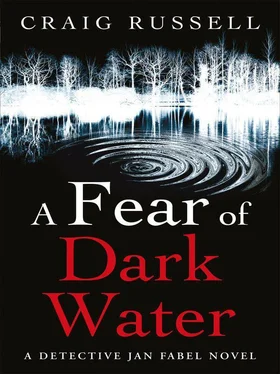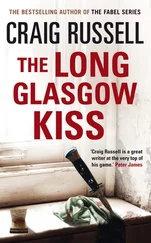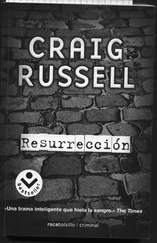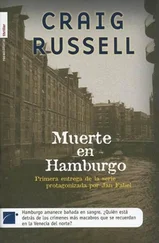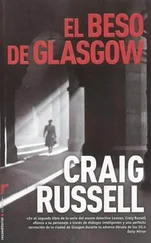Craig Russell - A fear of dark water
Здесь есть возможность читать онлайн «Craig Russell - A fear of dark water» весь текст электронной книги совершенно бесплатно (целиком полную версию без сокращений). В некоторых случаях можно слушать аудио, скачать через торрент в формате fb2 и присутствует краткое содержание. Жанр: Триллер, на английском языке. Описание произведения, (предисловие) а так же отзывы посетителей доступны на портале библиотеки ЛибКат.
- Название:A fear of dark water
- Автор:
- Жанр:
- Год:неизвестен
- ISBN:нет данных
- Рейтинг книги:5 / 5. Голосов: 1
-
Избранное:Добавить в избранное
- Отзывы:
-
Ваша оценка:
- 100
- 1
- 2
- 3
- 4
- 5
A fear of dark water: краткое содержание, описание и аннотация
Предлагаем к чтению аннотацию, описание, краткое содержание или предисловие (зависит от того, что написал сам автор книги «A fear of dark water»). Если вы не нашли необходимую информацию о книге — напишите в комментариях, мы постараемся отыскать её.
A fear of dark water — читать онлайн бесплатно полную книгу (весь текст) целиком
Ниже представлен текст книги, разбитый по страницам. Система сохранения места последней прочитанной страницы, позволяет с удобством читать онлайн бесплатно книгу «A fear of dark water», без необходимости каждый раз заново искать на чём Вы остановились. Поставьте закладку, и сможете в любой момент перейти на страницу, на которой закончили чтение.
Интервал:
Закладка:
‘He just kept the knife at my throat. Otherwise he wasn’t violent. As his father made sure to point out, I didn’t have any bruises to show the police. No signs that I struggled for my virtue, as he put it, the old bastard.’ Ulmen looked through the passenger window for a moment, out to the dark green of the forest. ‘In a weird way, and I know this does sound really weird, but I don’t think Daniel thought for a second that he was doing anything wrong. I’ve thought about it a lot, over the years — doing what I said and imagining it was something you just read about happening to someone else… that makes it easier to be objective about it. Anyway, when I think back to the way he was, it was as if he didn’t really understand that I was there. You know, theory of mind or simulation or whatever psychologists call it. I think both father and son were sociopaths of some kind — I’m not being bitter, I really do believe that. I honestly think Daniel Fottinger didn’t understand that I had the independent consciousness to truly give or withhold consent.’
‘As if you weren’t really there?’ asked Fabel.
Tanja Ulmen stared at Fabel. ‘Yes. Yes, that’s exactly it,’ she said, animated for the first time during the conversation. ‘Like I wasn’t really there.’
On the way back to Hamburg, Fabel asked Anna for the address of the Turkish restaurant that Muller-Voigt and Meliha Yazar had dined in regularly.
‘Could you give them a ring and see if that waiter’s back from holiday?’ he asked her. ‘And if he is, could we talk to him when we get there?’
Anna phoned and confirmed to Fabel that the waiter would be waiting for them when they arrived.
‘Did you see the report that Tramberger, the Disaster Team guy, sent in?’ asked Anna. ‘It arrived this morning.’
‘What, from his Virtual Elbe thing? No, I haven’t had a chance yet.’
‘You should. According to his model, and he says he ran it several times, that torso was dumped three kilometres upstream, but right in the middle of the river, in the deep channel.’
‘From a boat?’
‘Looks like. He says we should get the pathologist to check for signs that it had been weighted. He thinks that whoever dumped it there did so because it’s the deepest part of the Elbe that far upstream. Fewer big vessels, more barges and less likelihood of it being churned up. His opinion is that the torso was meant to stay at the bottom and never be found. Makes sense, Jan. My guess is that the head and limbs are scattered along the bottom as well. Whoever did this really didn’t want her identified.’
The Ottoman Palace was a lot less grand than the name suggested, but it did have a certain style to it. No cliches or walls bedecked with tourist posters of Turkey. It was a simple eatery with subtle reminders, such as the colourful kilim tapestry on the wall, of the culture behind the cuisine. While they waited for Osman, the waiter who had regularly served Muller-Voigt and his date, Fabel had a good look around the restaurant. It would not have been Muller-Voigt’s normal type of place; it was a choice, whether Meliha’s or Muller-Voigt’s, that owed a lot to discretion.
A smallish man of about twenty-five or so, with russet-blond hair, brought his eager smile out of the kitchen. He introduced himself as Osman, and told Fabel he would happily do anything he could to help. Osman was one of those people whose exuberant good nature, no matter how hard you tried to ignore it, was infectious.
‘She had an Istanbul accent,’ Osman explained after Fabel had asked him what he could remember about Meliha. ‘She sounded well educated and I got the idea she was quite rich. Her clothes were expensive. She was a beautiful woman.’
‘But the owner here said he got the feeling that she didn’t like talking about herself.’
‘That’s for sure. Naturally, when a customer speaks to me in such perfect, beautiful Turkish, I ask where they are from. As soon as I asked her I really got the feeling that I’d done the wrong thing. It’s funny with customers. You learn to drop a topic quick sometimes. The last thing you want is a patron to feel uncomfortable,’ he said very earnestly.
‘And she was particularly sensitive about where she was from?’
‘I got that idea. When I asked, she said she was from Silviri, on the coast near Istanbul, but the shutters came down, if you know what I mean. So, like I said, I dropped it quick.’
‘Did they seem happy?’
‘Very. Especially him. They were a nice couple. Good together, if you know what I mean. There was a big age difference, of course, but they seemed to be totally into each other.’
‘Was there ever any interaction between them and anyone else? Did they ever bring any friends or guests to the restaurant?’
‘No. It was always just the two of them. I don’t even remember any other diners coming up to them and saying hello in passing. That was their usual table…’ Osman pointed to the furthest-away table at the back of the restaurant, at the end of the seating arc. It confirmed Fabel’s theory about the restaurant being chosen because it offered an element of anonymity: no one would pass that table to leave or go to the washrooms. Meliha and Muller-Voigt would have had to endure only Osman’s good-natured interruptions.
‘I want you to think very hard, Osman,’ said Fabel. ‘Was there anything, anything at all, out of the ordinary that you can recall about them?’
Osman frowned as he did exactly as Fabel had asked. After a moment he said: ‘No, I’m really sorry, but there was nothing. They were just a happy couple who seemed very involved in each other. I was so upset when I heard about Herr Muller-Voigt. I really wish I could do more to help…’
‘Thank you, Osman. You have been very helpful.’ Fabel smiled; he knew the young waiter really had done his best to remember any useful detail. Fabel thanked the owner of the restaurant and he and Anna headed for the door.
‘I was surprised she didn’t come in here more often,’ Osman said as they were leaving. ‘With her living so near.’
Both Anna and Fabel froze in the doorway. They stepped back in, letting the door close behind them.
‘You know where she lives?’ asked Fabel. Something like a small electrical current tingled in the back of his neck.
‘Well… yes. I guess. Unless she was just visiting, but it looked to me like she lived there.’
‘What do you mean?’ asked Anna.
‘There’s an apartment building about three blocks away. I was passing it one day — my cousin lives in the next building — and I saw Frau Yazar go in through the main door, carrying groceries.’
‘Get your jacket…’ Fabel said to Osman and held the door open.
It took no longer than fifteen minutes of talking to her neighbours to establish that Meliha Yazar lived on the third floor of the building. It was a modern apartment building only three blocks, as Osman had said, from the Ottoman Palace.
Once they had established that they had found the right place, Fabel had sent Osman back to the restaurant, the young waiter beaming at the thought that he really had contributed something worthwhile. Fabel had been able to dispel Osman’s only concern that perhaps Meliha Yazar was in trouble with the police.
‘Not at all,’ Fabel had said reassuringly. ‘We’re trying to help Frau Yazar. You have helped Frau Yazar.’
Osman had gone back to work happy.
But it soon became clear that Meliha Yazar was not Meliha Yazar.
‘You mean Frau Kebir…’ said the young mother who had answered the door of the other apartment on the third floor, clutching a toddler to her flank. ‘I haven’t seen her for ages. Maybe a month. She does go away a lot. To do with her job, probably. I think she maybe goes back to Turkey.’
Читать дальшеИнтервал:
Закладка:
Похожие книги на «A fear of dark water»
Представляем Вашему вниманию похожие книги на «A fear of dark water» списком для выбора. Мы отобрали схожую по названию и смыслу литературу в надежде предоставить читателям больше вариантов отыскать новые, интересные, ещё непрочитанные произведения.
Обсуждение, отзывы о книге «A fear of dark water» и просто собственные мнения читателей. Оставьте ваши комментарии, напишите, что Вы думаете о произведении, его смысле или главных героях. Укажите что конкретно понравилось, а что нет, и почему Вы так считаете.
